Hey—do you know the TeeTurtle squad, otherwise known as those people behind those viral stuffies that can change their mood at your will?

Well, they’ve expanded beyond toys & into the realm of games, trading out colorful, cotton-filled octopodes for equally colorful card-stock unicorns. And, man, does Unstable Unicorns confirm just how well TeeTurtle leverages the most dramatic & dichotomous of moods via such a cartoony style. I mean, the game is called Unstable for a reason—playing got me frustrated, got me elated, got me calculated, got me fascinated. Based on how WORN OUT & FRAYED the Unstable Unicorns card deck in the Weston Game Lab was…I don’t think I’m the first person around here to feel all these ways, feel all these “immense variations of pleasure.”
Perhaps that wide spectrum of emotions is good to point out…and better to elaborate on. For the sake of concision (something I’ve been told to work on—in the context of a UGD pitch presentation, but whatever), let’s just focus on my favorite F-words: Frustrated & Fascinated. Sorry, “Elated” & “Calculated.” I’m filtering you out** of my mental deck.
…Play can be pleasurable when it hurts, offends, challenges us and teases us, and even when we are not playing. Let’s not talk about play as fun but as pleasurable, opening us to the immense variations of pleasure in this world.
Miguel Sicart, 2004 (full quote available on Week 1 slide deck)
If I experience ANY sort of reaction to a game (i.e. “I’m challenged by the Unstable Unicorns rule set”) while playing it, my mildly unreliable recollections of AP Psychology suggest that I am more likely to remember it, engage with it in the future, etc. I’m sure play & memory are very well intertwined. Give me an emotional buoy to the game, baby. Give me a reason to care; that’s the core of storytelling.
“We are frustrated”
PLAY CHALLENGES US
Special shoutout to Yiming for deciphering the rules & mechanics of Unstable Unicorns with me. Doing so frustrated us, which goes to show prototyping/iteration aren’t processes solely reserved for game designers. As the people listening to the game, reacting to the game, we have to refine our understanding of it every turn; strategies, to some degree, are nebulous little prototypes.
We’re both first-time UU players. Let it be known that I am used to simple rulesets & the sorts of mechanics gamers can learn in seven seconds, best epitomized by the minigames of Mario Party and the microgames of WarioWare. For analog games, I am also used to reading my rules & mechanics on some giant, flappy sheet of paper included in the box, RATHER THAN ON THE INTERNET. I mean, this is an ANALOG game, right? I shouldn’t need to rely on UChicago Secure Wi-Fi to figuratively unicorn barf all over my friends. Below is my BuzzFeed listicle/highlight reel of what I gleaned about Unstable Unicorns—do these anecdotes render you frustrated, too? Maybe…maybe not.
- How do I play? UU is a turn-based card game. Each player has two decks of cards at their disposal: the (un)Stable deck & their Hand. Cards have different effects; effects are dormant in the Hand & active in the Stable. Some cards emit main character energy (i.e. they feature unicorns). Others are part of the supporting cast: unicorn-adjacent upgrades & downgrades & magic spells & such. The 2-player version required us to filter out** a ton of cards, so it’s arguable that neither of us got the best sense of this game’s potential. Verdict: prep time took too much time.
- Can I win? I mean, I’d HOPE so. There IS a win condition. (UU is a game, after all—not one of those brain-splitting New York Times sudokus). But Yiming was bang on when he pointed out just how well-balanced 2-player UU is. The effects of my cards kept canceling out the effects of his cards, & vice versa, sticking us in an effervescent for-loop of “Wow, smart move!” and “WHY DID YOU DO THAT?!”. Verdict: a well-balanced 2-player game also strikes a great balance between fun and frustrating.
- It doesn’t help that turns are multistep & I kept messing up/double-checking the order, like the under-experienced overthinker I am. Anyway, if you want to win, get seven unicorns into your Stable deck.
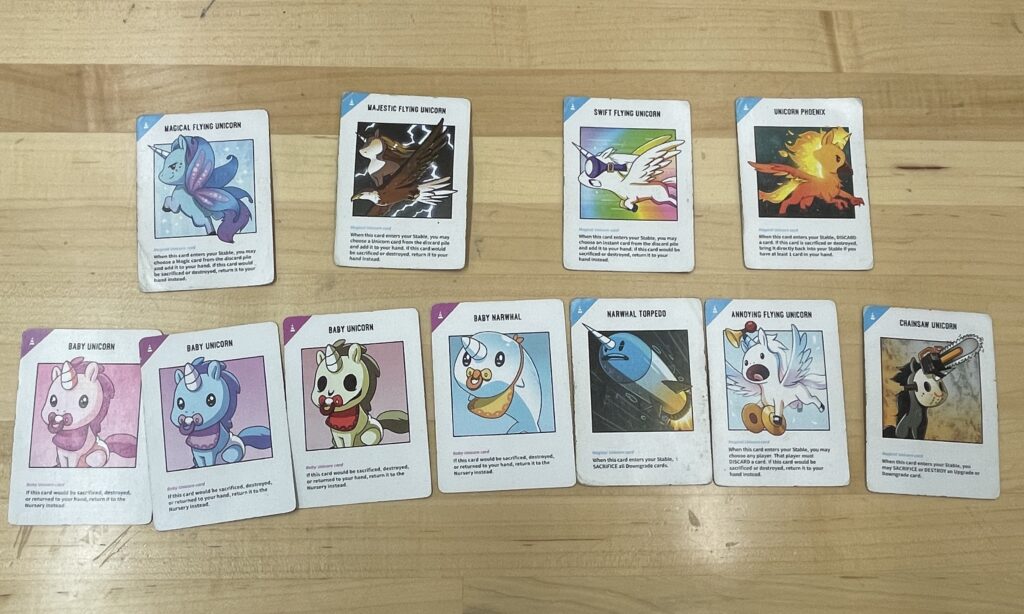
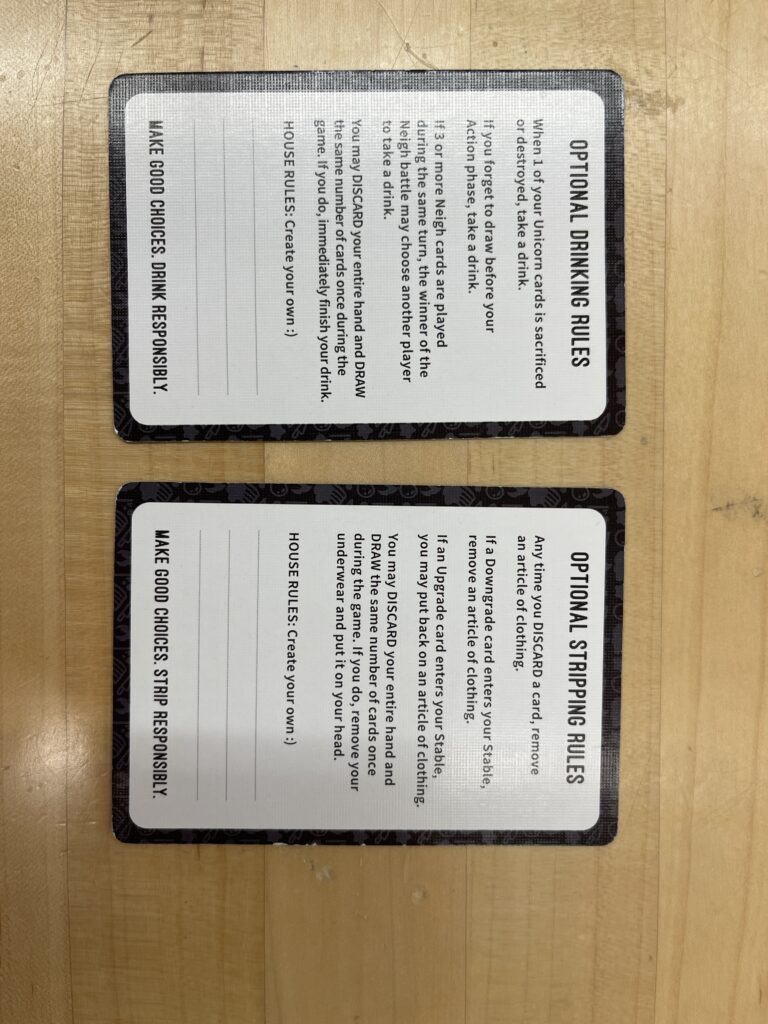
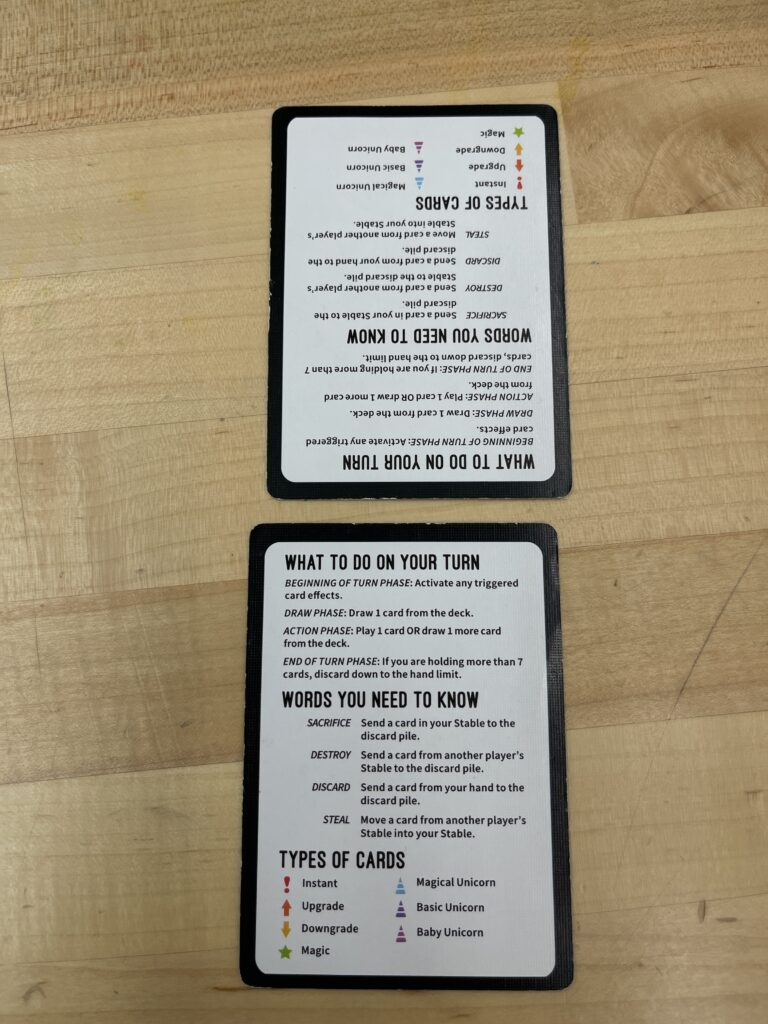
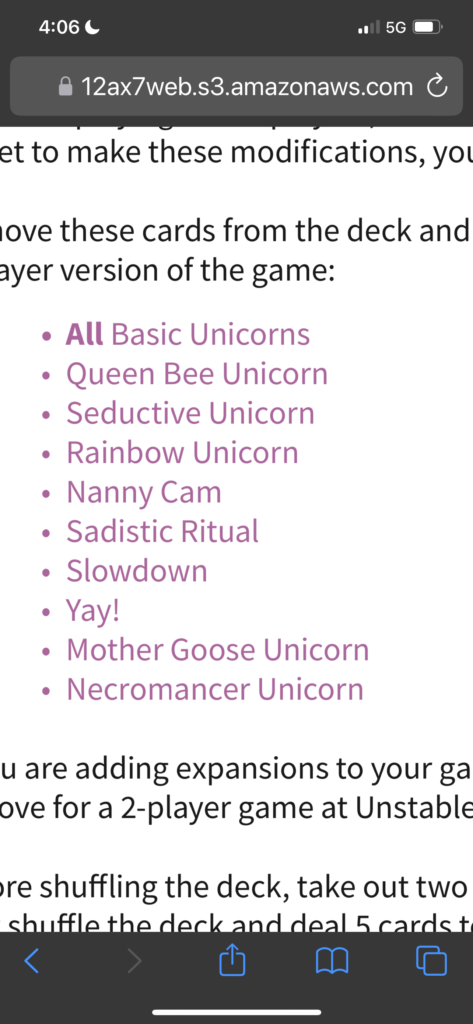
“I am fascinated”
A RELATIVELY BRIEF POST-PLAY REFLECTION
Upon some post-play pondering, I discovered two reasons why this game piqued my fascination in the first place, why I gave it my First Impression Rose over all the other analog treasures in the Weston Game Lab.
ONE: IT REMINDED ME OF LEAP OF FAITH
Call this reason my egocentrism at work, but the visual premise of Leap of Faith (the game I designed with Ren, who is awesome) aligns pretty much perfectly with UU‘s: cartoony animals doing anthropomorphic, chaotic things. I love UU‘s sense of amphibiousness, too: it embodies a G- and R-Rated spirit all at once (check out the “Optional Drinking/Stripping Rules” image); it utilizes both turn & effect mechanics; it was simple & confounding all at once. UU additionally managed an admirable fusion of skill & luck—whereas our game had a different reception (not better, not worse) for being mostly luck-based during play-testing!
“Leap of Faith is a combination of literally every analog game I’ve ever played. Lean into that!”
Elle to Ren and me, Week 3 playtesting
(Not to mention how all those quirky unicorny effect mechanics inspired me to create custom frog-meeples for Leap of Faith & make the meeple designs meaningful to actual gameplay…)
TWO: IT PREPARED ME FOR HARDER TURN-BASED GAMES
As a basic Nintendo bro as set in their ways as a broken Wii console, I find it discomfiting to spread my wings & explore other genres and purposes of game. To quote the “Some Perspectives on Games” slide from Week 2:
➪ What I initially knew (and still holds true) about games: “A means for leisure, entertainment, or distraction”
➪ What I now know is possible for games to be: “A designed experiment (in both an artistic and scientific sense),” “A storytelling system,” “The mathematical lens of probability and balance,” etc.
Needless to say, Wingspan Solo was a toughie, & I probably messed up in my execution of the rules a TON. At the same time, though, I could take what I learned from Unstable Unicorns and apply it to this behemoth of an “aviary solitaire” game: one, there is no CORRECT way to learn a game; two, card/turn mechanics across games have very similar underlying structures; three, you’re not an idiot for not getting it on your first go. You’re human. We can’t all be unicorns.
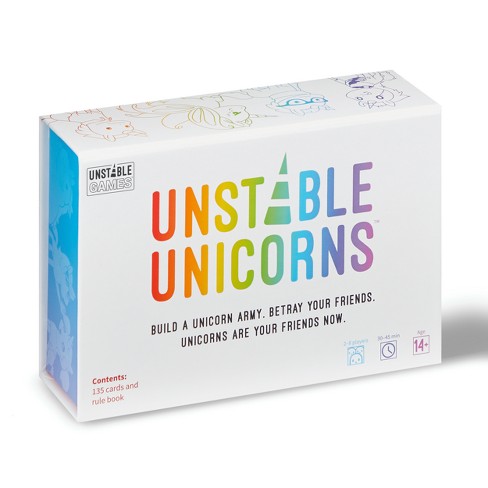
Hi, I’m Loofah.
Hope you enjoyed the blog post.